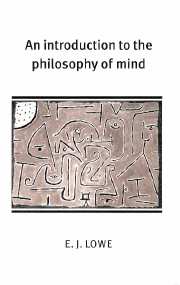Book contents
7 - Thought and language
Published online by Cambridge University Press: 05 June 2012
Summary
So far in this book, we have discussed various different kinds of mental state, including sensations, perceptions (that is, perceptual experiences) and beliefs. We discussed beliefs (and other propositional attitude states) in quite some detail in chapters 3 and 4, before going on to talk about sensations and perceptions in chapters 5 and 6. This order of discussion – although consistent with the overall plan of the book – might strike some readers as being an inversion of the natural one, because it is natural to assume that sensations and perceptions are, in more than one sense, ‘prior’ to beliefs. They seem prior to beliefs, first of all, in the sense that many of our beliefs are based on, or derived from, our sensations and perceptions, whereas the reverse never seems to be the case (except, perhaps, in certain species of delusion). Secondly, sensations and perceptions seem prior to beliefs in the sense that, whereas we might be willing to attribute sensations and perhaps even perceptions to a creature which we deemed incapable of possessing beliefs, I think we would – or, at least, should – be less willing, and perhaps altogether unwilling, to attribute beliefs to a creature which we deemed incapable of possessing sensations and perceptions.
Part of what is implied here is that beliefs are mental states of a higher cognitive level than are either sensations or perceptions.
- Type
- Chapter
- Information
- An Introduction to the Philosophy of Mind , pp. 160 - 192Publisher: Cambridge University PressPrint publication year: 2000



